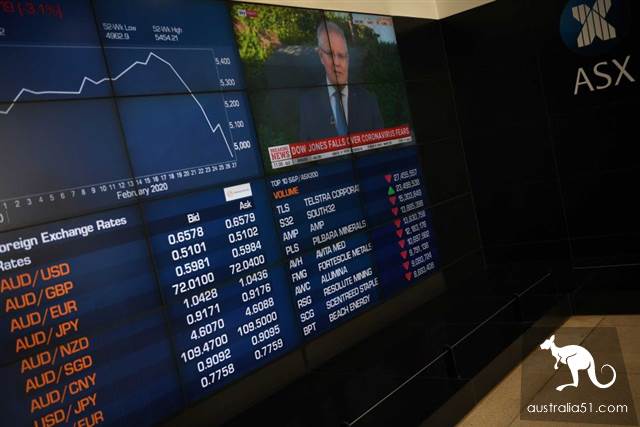
Australian stocks have tumbled 30% since their peak on February 20
Australia`s stock-market benchmark s & p/ a 200 index (S&P/ASX200) plunged to 537.3, or 9.7%, at the 5,002 mark, marking its worst-ever day.
While the Fed reduced interest rates to zero and Australia government it said it would launch a second wave of measures to combat the economic effects of the worsening epidemic after last week`s $17.6 billion stimulus, and could not stop the local stock market crash.
ASX200 index hit a new high in just a few weeks since february 20th and is now down 30%! And a 20% drop from the peak is a bear market.
The australian composite index, which fell 9.52% to 5,058, the index`s biggest one-day decline since 1987, lost 165 billion yuan in total market value.
Six of the 11 largest segments of the local stock market fell by more than 10 per cent, with the energy sector index losing the most, with a 13.5 per cent plunge.
The financial-stock index also plunged 11%, with all four banks bleeding. The National Bank (NAB) plunged 12.4 per cent to 16.12 yuan, to its lowest level in 1997; ANZ (ANZ) plunged 12.5 per cent to its lowest level in 15 years of $16.45; Western Pacific Bank (Westpac) plunged 11.8 per cent to $15.98, its lowest level since 2008; and the Federal Bank (CBA) lost 10.0 per cent its lowest level in 2012, at $59.72.
The Australian dollar plunged to 61.69 cents in the local currency market, more than a cent loss from 62.98 cents at Friday`s close. The Australian dollar plunged once to its lowest level since 2003, at 60.96 cents.
At the same time, the Federal Reserve Bank of Australia said it was "ready" to inject more money into the Australian financial system to order to safeguard the functioning of local financial markets as the outbreak of the new crown pneumonia scared off global investors.
In its new statement, the central bank said it would take the necessary measures to keep Australian financial markets afloat.
The Reserve Bank is prepared to buy more bonds in government secondary market to support the smooth operation of the market, which is a key pricing benchmark for the Australian financial system, said central bank governor Dr. Lowe (Philip Lowe).

